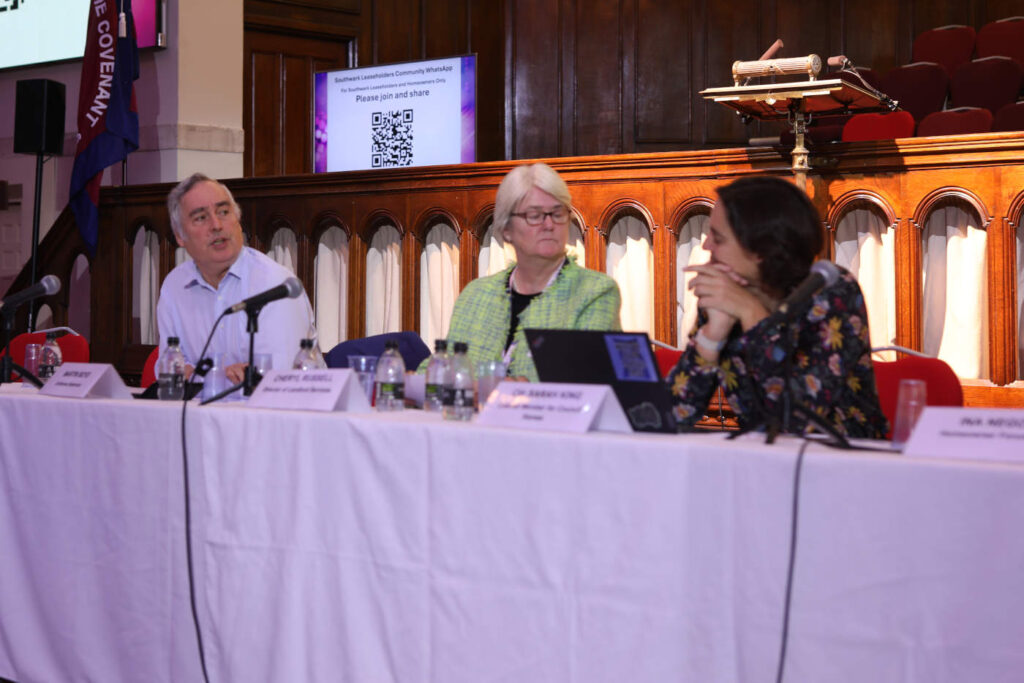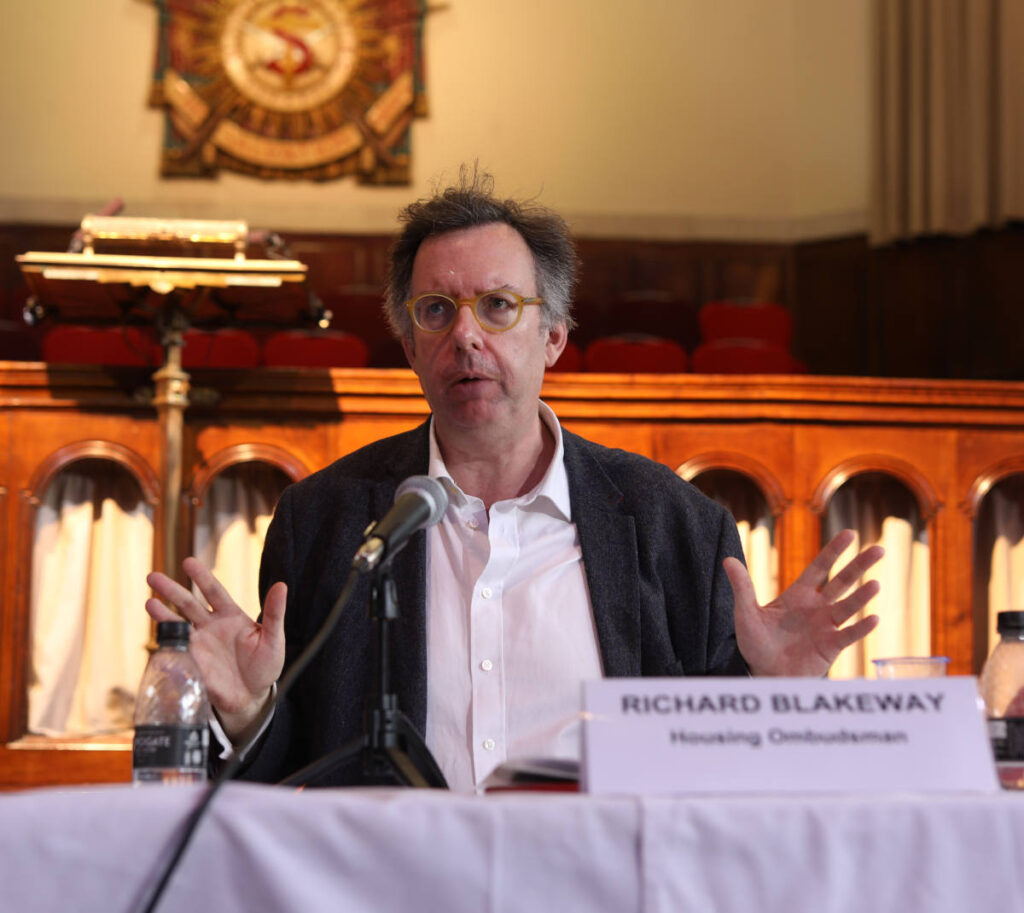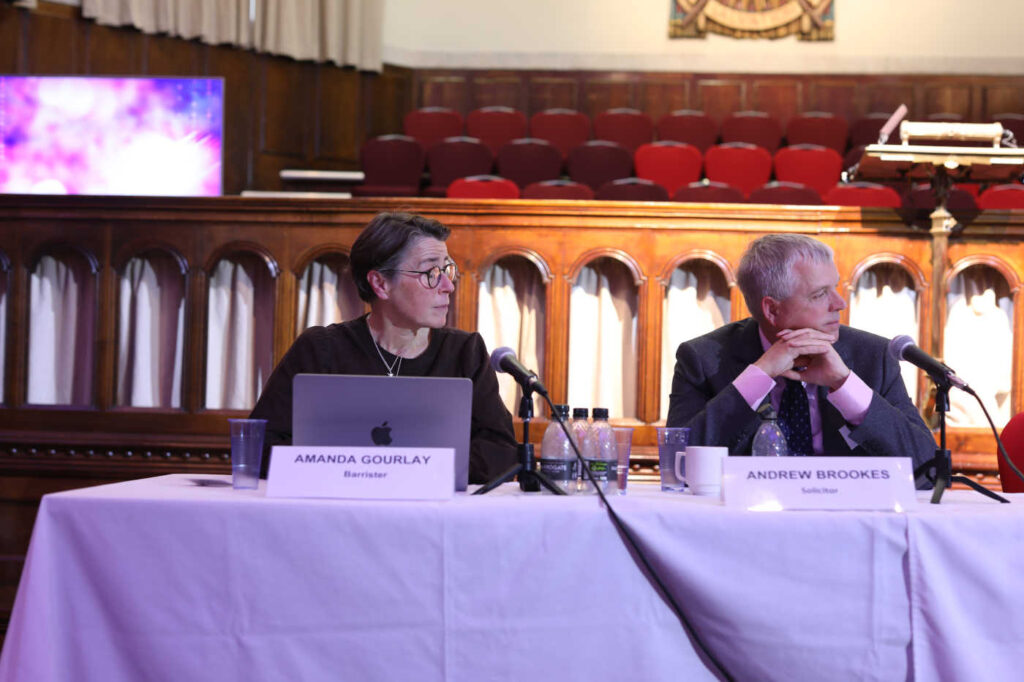
Council faces its disgruntled private leaseholders
Superb presentations from lawyers on how to unpick service charges which will help any leaseholder
Contractor’s outrageous £28,000 bill for 10 mobile phones exposed
Social Housing Ombudsman urges wronged leaseholders to raise complaints
Seemingly alone among local authorities Southwark actually funds a full-scale conference for its private leaseholders in social housing blocks – which, of course, is utterly unthinkable for landlords in the commercial sector such as the kindly Vincent Tchenguiz, Luca Padulli, James Tuttiet, the brothers Gould, Will Astor and all the rest of them (although most private equity punters in resi freeholds are unknown, hiding behind nominee directors and usually offshore).
So it is awfully hard cheese on Southwark that its leaseholders don’t appear to overwhelmingly grateful for its policy of engagement.
Many grievances were aired at this year’s conference last Saturday at the Salvation Army HQ in Dulwich, south London, notable among them supposedly more eco communal heating systems.
When chairman Martin Boyd – also chair of LKP and the Leasehold Advisory Service – asked whether any of the 420 attendees had had issues with communal or district heating systems the eruption of hands resembled a volcanic pyroclastic flow and was virtually unanimous.
It was also bad luck for Southwark that the day after the event The Daily Telegraph took up the story that its building contractors Elkins proposed charging leaseholders caught up in major works misery £28,000 for 10 mobile phones.
At the Consort Estate 83 private owners face individual bills of up to £50,000 each, as was reported earlier this month by Southwark News in which LKP stated the charges were “an absolute Mickey take”.
It appears the phone bill has evaporated to merely to £8,000, a fraction of the initial estimate.
Labour council bills homeowners £28,000 for builders’ mobile phones
Southwark leaseholders each face £50,000 cost for £17m ‘unexpected’ revamp
Exclusive: Peckham homeowners fear ‘financial ruin’ over ‘wipe out’ £50,000 major works bills
Peckham homeowners fear “financial ruin” after receiving estimated council bills of up to £50,000 for works to their homes. Consort
Whereas I had suggested to Southwark News that these outrageously padded bills encouraged “a suspicion that private leaseholders are subsidising the housing stock of a local council”, this was an absolute certainty among many leaseholders at the Southwark conference.
So in the face of this kind of hostility it is a bit of a miracle Southwark continues to fund the conference – and turn up to face the music.

The first session of the conference was taken up with Labour councillor Sarah King, “cabinet member for council homes”, and the Southwark director of landlord services Cheryl Russell fielding a series of detailed questions addressing discontent at sites across the borough.
Ms King made general points about inflation raising costs and insurers such as Zurich leaving the leasehold insurance market altogether, while Ms Russell talked about the unstinting efforts of her unloved residents’ engagement team, for whom one could not help feeling a degree of sympathy: it is unlikely to be them padding the major works contracts, after all.
In a Q&A session leaseholders raised the post-Grenfell building safety issue – leaseholders are “absolutely and rightly frustrated by the delays”, apparently – and then the communal heating systems. Southwark insists that they are cheaper (and does not add that they hit bureaucrat imposed environmental targets), while leaseholders overwhelmingly said that they cost far more than having a simple boiler with one leaseholder in Peckham getting a £6,000 district heating bill.
Councillor King said that she did not believe that “creative accounting was going on” – this was the day before The Daily Telegraph took about the £28,000 for 10 mobile phones story – which was heard with some scepticism.
Martin Boyd pointed out that one aspect of the secondary legislation permitted by the 2024 Leasehold and Freehold Act would impose standardised service charge bills: allowing greater scrutiny and comparison with different sites. There is no indication when the government might get round to this, however.
Mr Boyd added that getting budgets wrong was inexcusable, and that Southwark appointed a host of accountants tasked with getting them right. This being their core competence.
“My site [the enfranchised private site Charter Quay, in Kingston] has never gone over budget and it is not acceptable for housing landlords to say that they cannot get budgets right.”
In the face of more detailed questing Councillor King and Ms Russell assured the conference that notes were being taken, that points raised would be addressed, that there were officials outside the hall who could be consulted and that next time they would have someone from the building safety team to answer questions.

Richard Blakeway, social housing ombudsman
The Housing Ombudsman is an invaluable resource for social housing private leaseholders, as well as tenants, and its chief urged the conference to make use of its services.
Headed by former London deputy mayor in the Boris Johnson era for housing Richard Blakeway, the ombudsman rules on issues of maladministration, which includes communication and transparency, and reports a host of cases on its website, such as this one involving Southwark’s neighbour Lambeth:
Lambeth Council to pay £13,000| Housing Ombudsman
Ombudsman orders Lambeth Council to pay £13,000 in compensation after 6 severe maladministration findings. Find out more.
The Housing Ombudsman should not be confused with the small-scale private property ombudsman schemes available to all leaseholders, which LKP believes should only be resorted to for sub £1,000 disputes.
Last year it ruled on a case where a social housing provider WHO attempted to get private leaseholders to vary their leases and then shut the cases down with Non-Disclosure Agreements (NDAs) – the highly controversial gagging deals beloved of bungling bureaucracies such as local councils and the NHS.
“We did not think either course was appropriate,” Mr Blakeway told the conference.
Since August there have been 27 complaints against Southwark council which met the ombudsman’s criteria for a complaint, whereas two years ago there were 11, so the Property Ombudsman is getting better known.
Complaints from all sources amount to 600 a month varying from communication and transparency, communal heating, shared ownership: the ability to staircase up and permission to sublet (ie when a block is caught up in prolonged building safety issues and flats cannot be sold), as well as property maintenance, especially leaks. EWS1 processes have also been investigated, especially in relation to management and maintenance contracts and break clauses.
Group complaints are especially welcomed, as the aim of the Property Ombudsman is to help as many households as possible. Test cases on issues such as communal heating contracts are also possible.
Before a complaint is investigated by the Housing Ombudsman, complainants have to go through the formal complaints procedure of the landlord.
Leaseholders facing massive major works bills under section 20 are a continual nightmare, especially for London council leaseholders. Mr Blakeway said that the ombudsman can and does investigate whether the section 20 process has been correctly followed, but it is not a forum to argue over the appropriate cost.

Fighting back: leasehold lawyers
The conference heard excellent presentations from two experienced leasehold lawyers: barrister Amanda Gourlay and solicitor Andrew Brookes, head of housing at Anthony Gold Solicitors.
Amanda Gourlay’s presentation with slides is an invaluable crib sheet for all leaseholders to dispute service charges, including section 20 major works schemes and they are available for all on her website here:
Communal lighting
Slides from my talk to the Southwark Homeowners’ Conference
Ms Gourlay presented slides suggest a whole range of questions that leaseholders could ask when faced with a major works bill. For example, if there is a fire risk assessment, who is the fire risk assessor, what are his/her qualifications, or is it simply a cut and paste job.
She alerted leaseholders to terms such as “to be installed” on the major works proposal, which may suggest that the block is to undergo some sort of improvement rather than repair of an existing service, which is what can be paid for under the lease.
Her crib sheets could prove invaluable in questioning landlords about their payment demands, and narrowing the focus to the issues which may subsequently be disputed. The crib sheets would also professionalise the leaseholders’ dialogue by concentrating on the detail of each element in the payment demand.
Andrew Brookes made similar points about improvements versus repairs, based on his own track record of disputes with Southwark council.
But he cautioned: “Many things involve some measure of improvement, and Southwark’s leases often do refer to door entry systems and double glazing as items to be paid for. But there is never a one size fits all approach to what is an improvement.”
He referred to the St Saviour’s estate where a dispute over fire doors went to the Upper Tribunal, which ruled that Southwark could charge for fire doors but only if the existing doors did indeed need replacing.
Mr Brookes made reference to the “Southwark steamroller” approach to major works, but private leaseholders in local authority blocks do sometimes win.
In Tower Hamlets v Brewster House and Malting House bills of between £60,000 and £70,000 per leaseholder for new concrete panels were overturned as the leases did not allow for payment to remedy structural defects.
“Sometimes victories do happen,” said Mr Brookes.

Fighting back: lawyers who happen to be leaseholders are unimpressed at tribunal
The Southwark conference also heard from two solicitors who are leaseholders and who have highly critical views about the leasehold system and the property tribunal.
Liam Spender, a commercial solicitor and LKP trustee, was highly critical of the property tribunal which for years has been headed by Judge Siobhan McGrath. she told the Southwark conference a few years ago what a friendly and informal place the property tribunal is.
“Well, the first thing you notice when attending the tribunal is that there is a fast entry lane for the insider lawyers – usually representing landlords – while the leaseholders have to form a queue. Then the lawyers will get a nice meeting room where they can plan the case, while the leaseholders must do any last minute planning in the public waiting area.
“Then there is the process: if landlords’ lawyers lose a document that seems to be alright, but if leaseholders do the same the tribunal is down on you like a ton of bricks.
“The entire process is not very professional and, given that I have experience of other courts, I was not very impressed at all.”
Ironically, he won his case but the landlord appealed – “using more of our money” – to the Upper Tribunal where it won the issue of a long term contract for a door entry system, which Mr Spender claims cost one and half times more than replacing the lot with a new system.
“Litigation in the property tribunal is not for the faint-hearted,” he concluded.
This sentiment was echoed by solicitor and Southwark leaseholder Clare Barnard, who is awaiting a decision on her case from the FTT.
She urged leaseholders taking action in the property tribunal “not to be made to feel small”: in her case two panels had to be held as the first demonstrated behaviour that compromised the case.
Amanda Gourlay strongly endorsed this view: “Don’t let yourself be bullied. You have an absolute right to be there.”
It was my task to conclude the conference – thanking Brendan, Liz, Mo, Tom, Ina and Cliff, who organised it – and I also thanked Southwark council for funding it, even though it was the subject of much criticism.
“Well, we pay for it,” shouted one leaseholder.
I reminded him that this was not the case: wider taxpayers were picking up the bill not just the private leaseholders in Southwark’s social housing blocks.
It is not just landlords and the property tribunal that need to be told home truths: sometimes leaseholders need them, too.





 Davidoff libel action against ex-Number 10 policy advisor collapses
Davidoff libel action against ex-Number 10 policy advisor collapses






















Our apartment block for over 55’s was built around 1993 with 30 mins fire entrance doors. Although at a recent survey by a Fire Officer who did not advise that the doors no longer complied, we are now being told by a “Contractor” that all the entrance doors should be replaced. Is this a legal requirement?
There is much misinformation about fire doors as part of yet another money making industry
Doors should not need replacing just because they are “old”
The guidance says
“However, there is no requirement to replace a fire door simply because it does not meet the current standard under Building Regulations if the door remains in full working order from a fire safety point of view.”
https://www.gov.uk/government/publications/fire-safety-england-regulations-2022-fire-door-guidance/fire-safety-england-regulations-2022-fire-door-guidance
No it is not a requirement. You need to challenge this. Is Fairhold your Freeholder?
No, the property is owned by Proxima GR Properties Ltd., managed badly by Churchill Estates Management Ltd.